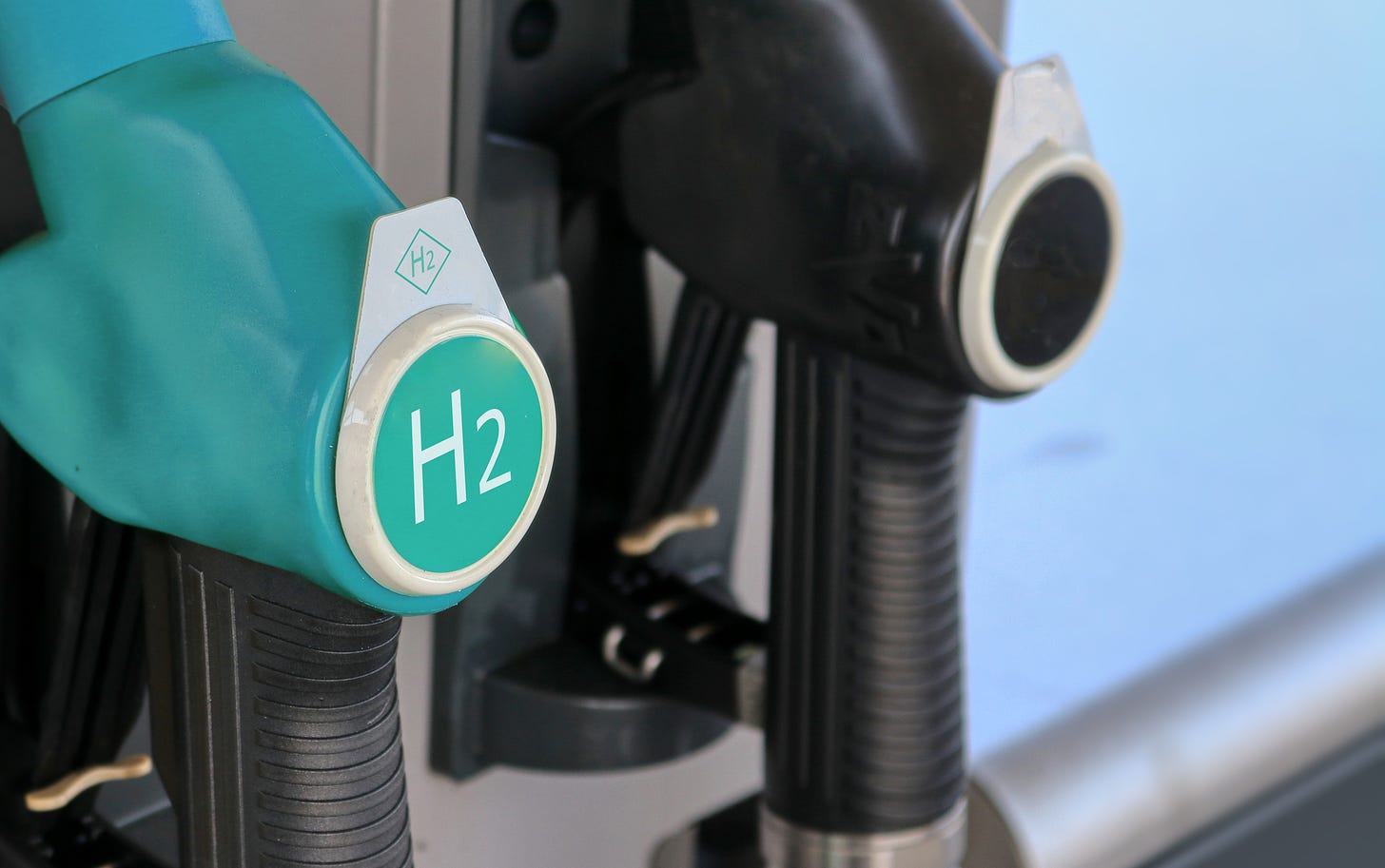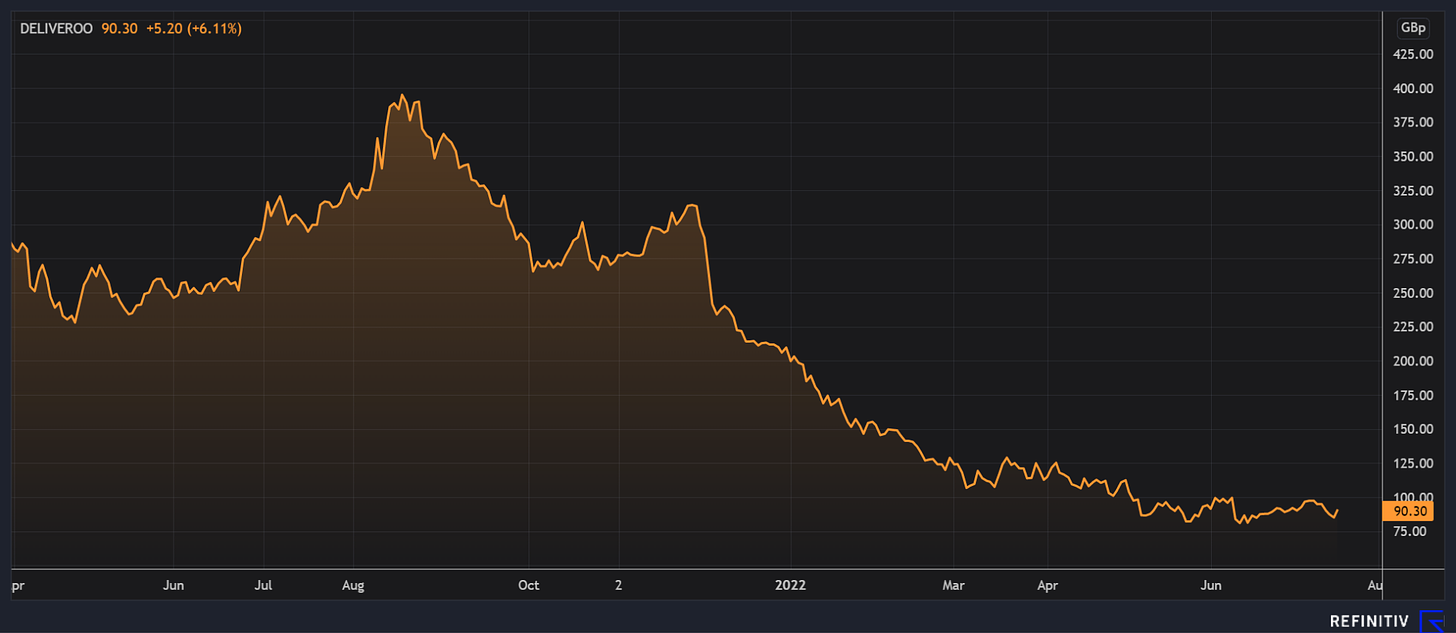Thanks for reading Off to Lunch. If this newsletter was shared with you please sign-up here to become a member
The development of hydrogen technology to power vehicles in the UK has taken a notable step forward today.
Firstly, Johnson Matthey, one of the UK’s largest industrial groups, has said it will build a gigafactory to manufacture key parts for hydrogen fuel cells. The announcement from the company comes less than a year after it abandoned plans to develop materials that could be used in electric car batteries. Johnson Matthey said last November that it had concluded that while demand for battery materials was accelerating it is “rapidly turning into a high volume, commoditised market” and it could not justify further investment.
The factory will be based at Johnson Matthey’s existing site in Royston, Hertfordshire, and cost around £80 million.
Secondly, ahead of the start of the Farnborough Airshow today, Rolls-Royce has announced it is going to trial hydrogen in two of its engines for smaller planes - the AE 2100 for civil and military aircraft and the Pearl 15 for business jets. “Rolls-Royce is planning a comprehensive series of rig and engine tests to prove the fuel can safely and efficiently deliver power for small-mid size aircraft from the mid-2030s onwards,” the company said. The full announcement is here.
The announcements show that hydrogen technology is making progress, despite the doubters.
Hydrogen technology has clear benefits compared to batteries. Firstly, the vehicle’s range is longer and refuelling can be done in less than five minutes. Secondly, electric batteries require some form of reliance on China, which accounts for 80 per cent of the global refining capacity for the raw materials used, notably lithium, cobalt and nickel, according to data from BloombergNEF. About 95 per cent of hydrogen comes from natural gas at present, but green hydrogen can be obtained by the electrolysis of water (although the source of electricity needs to be renewable for it to be zero carbon). Another key material in hydrogen vehicles is platinum, with South Africa the biggest source of that, rather than Russia or China, which account for a smaller share.
Smart people such as Toyota, Airbus and Wrightbus, which is making hydrogen buses for cities across the UK, are investing in hydrogen technology.
However, sourcing and storing hydrogen at a viable price is difficult, which is why the development of the technology for vehicles has become increasingly focused on freight and commercial transport, rather than cars, where electric batteries dominate the new generation of models.
I have written about this topic before (here is a column I did for The Times in February) and it is divisive. There are people on all sides of the debate about the future of travel and how hydrogen compares to electric batteries.
Johnson Matthey has focused its announcement on the potential of hydrogen for road freight, which it says accounts for 9 per cent of global CO2 emissions. You can read the announcement here.
Liam Condon, chief executive of Johnson Matthey, said: “The fuel cell market has now reached a pivotal moment with the increasing urgency to decarbonise transportation and today marks the next step of the journey to a low-carbon future in the UK.”
The company has got backing for the factory from the government through its Automotive Transformation Fund and Advanced Propulsion Centre. The government is understood to be putting millions of pounds into the project, although its investment accounts for much less than half of the cost. Kwasi Kwarteng, who has remained business secretary through the political chaos of recent weeks, said the new factory is "a major vote of confidence from Johnson Matthey in the UK”.
Johnson Matthey makes some of the most important parts of a hydrogen fuel cell, such as the catalyst-coated membrane. Its customers include the Chinese group Refire, whose hydrogen fuel cells are already being used on the road.
The announcements from Johnson Matthey and Rolls-Royce show that despite sales of electric battery-powered cars growing rapidly in the UK (up 56 per cent year-on-year in June and now 14.4 per cent of the market ) and Elon Musk’s public status, the zero-emission future of transport - personal, commercial and freight - is likely to be far more varied.
Monday warnings
It’s not just the Met Office issuing warnings today as the temperature heads to 40C - Deliveroo and Direct Line have both warned about their financial performance.
Deliveroo said in a trading update this morning that gross transaction value - the value of orders on the takeaway app - rose just 2 per cent year-on-year in the second quarter of 2022. The company said it was now forecasting growth of 4 per cent to 12 per cent for the year as a whole compared to 15 per cent to 25 per cent previously. This hit for Deliveroo looks to be clear evidence of households cutting back on spending amid a cost of living squeeze.
There is also a profit warning from insurance group Direct Line. It has been hurt by inflation too, but in a different way, with higher used car prices, more expensive parts and delays in garages completing repairs pushing up the cost of claims.
Interestingly, Deliveroo and Direct Line shares have gone in different directions on the back of the news. While Direct Line shares were down 4 per cent in lunchtime trading on Monday, Deliveroo was up more than 5 per cent. The rise in Deliveroo shares is a reaction to the company saying it managed to hold profit margins at its previous guidance amid the fall in sales, albeit at a level will mean a loss of £118 million for this year according to analysts at Jefferies. Deliveroo shares have had a miserable run recently, so the hit to sales appears to have been priced in already…
You should also read this
Insead in Paris is the top university in Europe for creating unicorns, at least in terms of where the founders of $1 billion businesses are from. Cambridge is second, LSE fourth and Oxford seventh (Sifted)
James Hurley at The Times has spoken to Robbie Lyle, the man behind Arsenal Fan TV (now AFTV), on how he has gone from a YouTube sensation to building a sports and entertainment business with 5 million subscribers and annual revenue of £1.8 million (The Times)
Interesting column from Patrick Jenkins in the Financial Times on the Bank of England’s bizarre decision to get rid of mortgage affordability tests as interest rates go up (FT)
A detailed look at Mohammed bin Salman’s $500 billion project to build a high-tech new city in Saudi Arabia. The plans for Neom are like something from a sci-fi movie, but the reality has been somewhat different so far, with problems relocating the indigenous residents, allegations of a toxic work environment, and a fortune spent on consultants (Bloomberg Businessweek)
A useful guide to keeping cool in the heatwave from the consumer experts at Which? It includes fans, shutting your curtains and windows, lukewarm but not freezing showers and hydrating foods (Which?)
If you missed it, here is Off to Lunch’s round-up of what was interesting in the Sunday papers…
And finally…
A bit of housekeeping to finish today. Off to Lunch will be taking a summer break for two weeks between Monday August 8 and August 22. I will be taking the opportunity to rest, refresh and bring together a collection of new ideas that will improve Off to Lunch on my return. I hope you understand the need for a break. If you would like to pause your subscriptions during this period, please do so - the option is available through the “manage subscription” or “settings” option on your Substack profile page.
As part of improving and developing Off to Lunch, it would be really helpful to me if you could provide feedback through the four quick questions below:
Thanks for reading. Off to Lunch will be back on Wednesday. If you enjoy Off to Lunch and want to read all our content, attend our forthcoming events and contribute to our work then please sign up to become a member below. Alternatively, please just share it and spread the word…
Best
Graham







